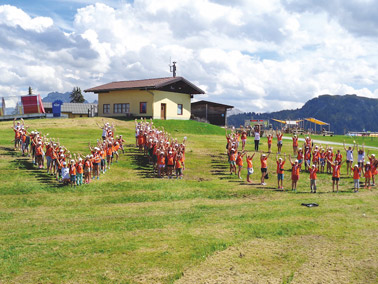Responsibility to employees
The success of an insurance company depends critically on its employees, their qualifications, dedication and expertise and the strength of their commitment to customer service. Vienna Insurance Group therefore positions itself as an employer of choice in a challenging international environment in order to search for and hire employees who can help promote its corporate culture and strategy with conviction. In addition to international career opportunities, mobility programmes, training and advanced training, the human resources area offers a large number of other initiatives, some of which are presented below.
Expectations of employees made transparent – VIG employee competence model
In human resources terminology, competences are behaviours that enable an individual to optimally fill a position. VIG’s Group-wide competence model provides clear descriptions of the behaviours expected of employees that contribute to the success of the Company.
These include:
- Collaboration and networking
- Openness to change solutions focus
- Service quality and customer retention
- Personal responsibility and contribution to the success of the business
Employees and management in all Group companies are evaluated in terms of the strength of their core competences and continuously developed. The competence model promotes local entrepreneurship based on the principles of cooperation and the Vienna Insurance Group philosophy. These expected behaviours are used to translate and communicate the Company’s strategy, success factors and values. The competence model helps managers fulfil their key responsibility for employee development, makes development paths visible and makes it easier to identify development needs within Vienna Insurance Group. Identifying development options creates employee motivation, commitment and loyalty. The competence model is customised for Vienna Insurance Group and provides adequate flexibility for local circumstances.
Expert career profile: experts asked to enter the limelight
Experts were identified as a strategic target group while the above-mentioned Vienna Insurance Group competence model was being developed, due to their particular importance to Vienna Insurance Group for implementing strategy and achieving success. To give this target group greater visibility and appreciation, and create clear development prospects, an expert career profile was developed with the following expert competences:
- A holistic approach
- Analysing tasks & finding innovative solutions
- Planning and completing tasks
- Effective communication
- Experts as role models
- Managing projects, processes and people
An important objective of this model is to formulate a shared understanding and clear expectations for the conduct and responsibilities of this career profile. Special local and Group-wide initiatives are also offered for experts, such as events for promoting information exchange and networking, and advanced training programs for learning practical approaches to problem solving, effective communication, systematic project management and similar measures.
Learning from our errors – HR manager conference focuses on error management
The annual Human Resources Management Conference is a key element in the Group strategy for the Group-wide exchange of best practices in the HR area. 41 participants from 29 Vienna Insurance Group companies in 17 countries met once again in autumn 2016 to share their experiences. The event offered two days of workshops and presentations and left a great deal of time for networking and discussion. It has now become a tradition for the meeting to select a new focal point each year. After Generation Y in 2015, the focus in 2016 was on dealing with errors in organisations. The conference included a presentation by a renowned outside speaker, Jan Hagan, from the ESMT Business School in Berlin with the title “Confronting and managing mistakes”. He presented a clear treatment of the topic using examples from the field of aviation.
A very special summer for the children of VIG employees

VIG Kids Camp
© Robert Newald
Once a year, Vienna Insurance Group’s principal shareholder, Wiener Städtische Versicherungsverein, invites the children of Vienna Insurance Group employees to VIG Kids Camp. Around 500 children from 23 countries once again spent two weeks at one of four holiday camps during the summer of 2016. In order to attend, participants are asked to show creativity. The motto for the drawing contest in 2016 was “Take a trip to another city – where would you like to travel the most?” Interested children of employees between 9 and 13 years of age could participate. The most imaginative submissions were rewarded with an invitation to VIG Kids Camp 2016.
Extremely family-friendly
Many people – and many companies – feel that achieving the proper work-life balance is one of the biggest challenges in life. Achieving this balance is easier if it is actively promoted by the company. VIG has a long tradition of assisting in this area and all three Austrian insurance companies – Wiener Städtische, Donau Versicherung and s Versicherung – have received the government's “berufundfamilie” (Career and Family) seal of approval. During the audit process for the seal of approval, companies develop family-friendly measures specifically tailored to the circumstances and employees in their business. After the measures have been successfully implemented and approved by an external certification body, the company receives the government seal of approval from the Austrian Federal Ministry of Family and Youth.
During the audit, the three VIG companies worked together with employees from a wide variety of areas to supplement the measures that already existed with many new measures aimed at improving the ability to balance career and family in the future. A few examples are: creating an information platform for parents and care-giving relatives, modernising the periodic employee reviews, expanding the existing childcare programme and creating awareness of active fathers, e.g. in the form of a “Papa Week” for young fathers.
